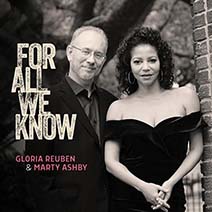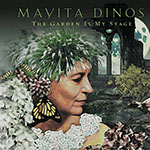Gloria Reuben & Marty Ashby
For All We Know
(MCG Jazz)
May 31, 2020
Reviewed by Jerry Osterberg

This new recording is nothing less than a love letter to the American Songbook. In addition to standards by Sammy Cahn, Jule Styne, Harold Arlen, and Hoagy Carmichael, it includes some “newer” composers and lyricists: Johnny Mandel, Rupert Holmes, and Alan and Marilyn Bergman. It is a gorgeous collection performed by two artists with over 70 years of music experience between them: Gloria Reuben and Marty Ashby. Credit must also be given to the popular jazz and blues singer Allan Harris, who participated as Reuben’s voice coach.
As an actress, Gloria Reuben has been a constant presence in film and television since she first appeared in the popular series ER for six seasons and more recently for four seasons of Robot.
In between, there have been countless other television shows and movies, including her much-praised performance in Steven Spielberg’s Lincoln. Reuben is also an author and a well-respected jazz singer with two previous albums to her credit, as well as an award-winning stage actress in the Public Theater production of Stuff Happens, in which she portrayed Condoleeza Rice.
Marty Ashby, who arranged every song on the album, accompanies Reuben on guitar throughout. The arrangements are straightforward, allowing every lyric and musical note to be heard (as the songwriters intended). Although there are impressive guitar solos, never does Ashby eclipse Reuben. He has been producing jazz concerts and recordings for decades, at last count 2,000 and 50 respectively. Five of the recordings for Ashby’s own MCG Jazz label have been Grammy Award winners.
“I’ll Close My Eyes” has an interesting history. Reuben performs this opening song as it has been performed for close to 75 years, most notably by Sarah Vaughan and Dinah Washington.
After singing the verse slowly, she switches to a quick-paced jazz tempo with the perfect amount of vibrato. Indeed, at some stage in the life of the song, it became a jazz standard, much different from the torch song it had been. Two years after it was first recorded, another lyricist wrote an entirely new set of words, keeping only the title, and adding a verse. Strangely enough, a doo-wop group by the name of the Skyliners, who struck gold in 1959 with “Since I Don’t Have You,” recorded “I’ll Close My Eyes” in 1961, reverting to the original lyrics.
In “Time After Time” Ashby has brought new life to a classic standard by following the seldom heard lovely verse with an elegant samba rendition. Reuben transitions effortlessly as Ashby lays down a fantastic accompaniment, allowing the singer to demonstrate excellent phrasing. In this rendition, one can hear an expression of sheer joy and an appreciation of a loving relationship that seems destined to last: “so lucky, lucky, to be loving you.”
Nothing about “For All We Know” could possibly lend itself to anything other than being sung just as it was written. While the verse seems to harken back to an earlier era (“Sweetheart, my love is still untold”), there’s nothing dated about the timeless message: to seize the opportunity now. “For all we know we may never meet again. Tomorrow may never come, for all we know.”
Ashby contributes a wonderfully warm guitar solo, and Reuben imbues each chorus with equal tenderness. This classic may well be the best argument for avoiding regret.
For me, “The People That You Never Get to Love” is one of the best tracks of the collection. The entire presentation by Ashby and Reuben is magnificent. Although Reuben could have easily turned in a respectable job a cappella, Ashby’s understated playing is never amiss. Written by the brilliant Rupert Holmes, the song was associated with the late Suzannah McCorkle, who liked it so much that she included this exquisitely lonely narrative on four of her albums. Reuben’s rendition grabs your heart every bit as much: “The saddest words that anyone has ever said are ‘Lord, what might have been.’”
“Where Do You Start” is one of two entries by Johnny Mandel, this one written with lyricists Alan and Marilyn Bergman. It’s been recorded by many artists, among them Nancy LaMott, Shirley Horn, and Silvia Syms. What I particularly like about Reuben’s version is that she allows the words to speak for themselves. There’s no attempt to overdramatize a moment that is all about emotion. With just a bit of light vibrato, Reuben’s voice simply tells the story of the friendly breakup of a longtime relationship. It seems likely that this narrator has given more than her partner, yet she’s far from bitter: “I promise there will always be a little place no one can see. A tiny part within my heart, that stays in love with you.”




